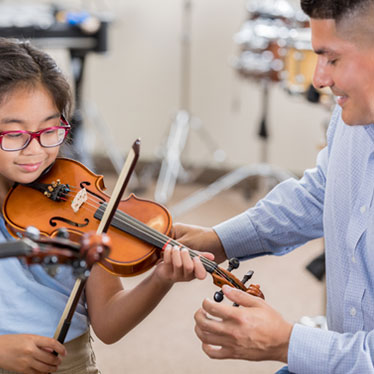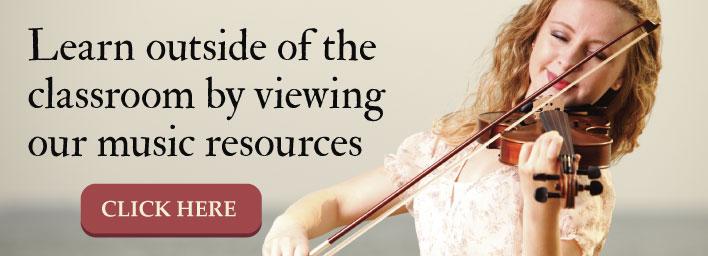Qualities of a Great Violin Teacher

Your relationship with your violin teacher is integral to enjoying the instrument, cultivating a strong work ethic and remaining inspired. This is why it's so important to find the right teacher for your level of musicianship, your mid-term musical goals and your personality.
Notice we said, "mid-term goals?" This is because a beginning violinist doesn't need a teacher who can get them into the world's most esteemed conservatory, just as Julliard-bound musician might need to move on from their high school violin teacher to find someone who can provide the next great challenge. The goal is to find the right teacher, at the right time, for where you're at in your musical journey.
Don't settle for the first violin teacher you find online, or via a friend's recommendation. Instead, take time to read a few different websites or profiles, and then speak with prospective teachers yourself in order to find the teacher that resonates with you.
5 Qualities That Define a Great Violin Teacher
As you begin learning about your options, keep the following qualities in mind. Each one should be viewed as a must-have before beginning your first lessons.
1. They love to teach music (they've always wanted to be a teacher)
Sure, most accomplished musicians dream of "the big time," but after that, the best music teachers always loved to teach and help others.
Sometimes, people fall into teaching because they're great at something or it comes easy to them, and music teachers are no exception. However, we all know that being good at something doesn't make us good teachers. Teaching is a calling unto itself, which is why the best violin teachers are more than just great musicians - they have a love of teaching too. If your teacher is bitter about the fact they have to teach to make a living, you'll struggle to fully embrace your own musicianship.
A love of teaching is Priority #1 when searching for a violin teacher. Once you've established that, you can move on to the following qualities.
2. They implement flexible teaching styles
There are techniques that are set in stone (more or less), but there is certainly room for flexibility in how those techniques are taught, the structure of the lesson and even the amount of students who participate in the lessons. For example, some students find that solo lessons are exhausting and boring, but group lessons - done chamber style - keep them engaged. Some students do well when lessons include games and fun, others prefer to remain in business mode.
If you're someone who prefers lessons that include "outside the box" methodology, look for a teacher who can accommodate. They do exist.
3. They teach students at your level - and beyond.
Just as some teachers are more suited to elementary school than high school settings, most music teachers have their "sweet spot" when it comes to the ages/levels they teach. Make sure the teachers you're "auditioning" specialize in students who are your age and level of musicianship. It's also good to work with a teacher who teaches several levels beyond yours, so you can form a lasting relationship before needing to move on to the next phase of your training.
4. They're willing to be auditioned
Some teachers offer a free consultation or 30-minute session, but most don't. That's okay, but any prospective teacher should be willing to treat your first lesson or two as a mutual interview/audition. Your rapport with the teacher - positive or negative - will affect the way you learn, practice, and play.
Therefore, it's worth trying a few different violin teachers on for size before choosing the one that fits you best.
5. They're open to a variety of musical genres
If you're a pure classical player, you can skip this one. However, today's musicians enjoy learning traditional classical music, and also appreciate learning music that's more relevant to them. This can become a sticking point for older or more traditional teachers who believe playing more than one musical style will "ruin you" as a violinist.
If you're interested in using your violin to play classical, folk, rock, your own music, etc., make sure you check this point with prospective teachers so you find one who both supports and embraces that aspect of your musical self.
Finally, ask your favorite prospects for references from both students they work with now, as well as students who've moved on. Speaking with your musical peers, asking them questions about your concerns, is a great way to get the inside scoop on a teacher to help you make a more informed decision.
In a perfect world, none of us would have more than one or two private teachers from childhood through the beginning of university. That is an indicator that we chose the best violin teacher for us.


